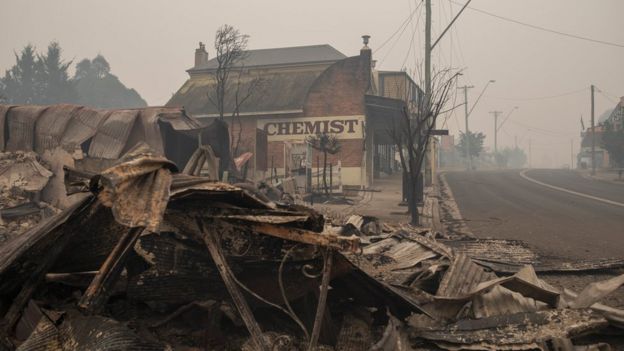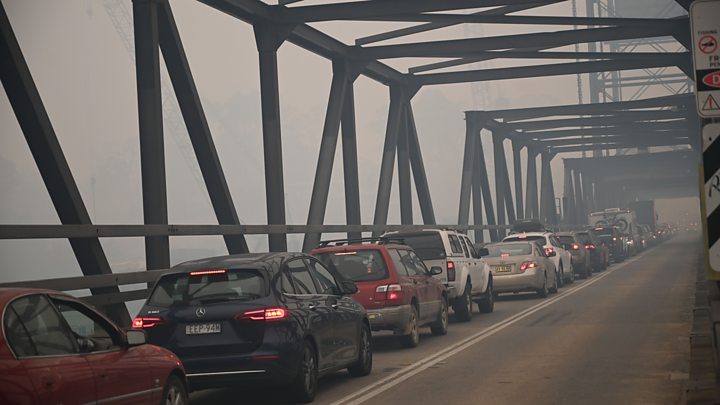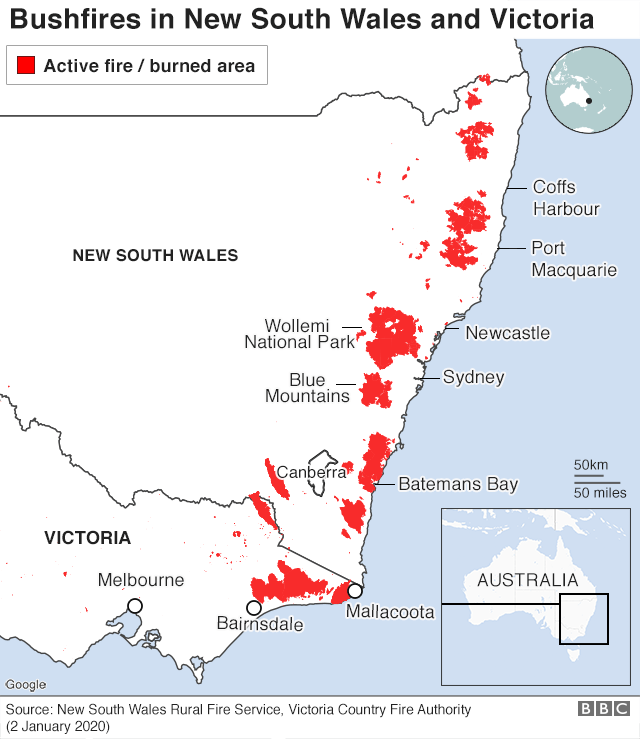
Audio By Carbonatix
Australia's PM Scott Morrison had to cut short a visit to a town ravaged by fire after angry locals heckled him over the government's response.
Locals said he had done very little to help Cobargo in New South Wales (NSW), where two people died earlier this week and many lost their homes.
The PM said he was "not surprised people are feeling very raw".
NSW's premier has declared a week-long state of emergency in response to the escalating bushfire threat.
Since September, bushfires have killed 18 people and destroyed more than 1,200 homes across NSW and neighbouring Victoria. At least 17 people remain missing after fires this week alone.
Thousands of people are already fleeing a vast "tourist leave zone" in NSW, with supplies running low in some cut-off towns. It's been called "the largest relocation out of the region ever".
Troops are also preparing to evacuate some of the 4,000 people trapped by fires in Victoria.
 Image copyrightEPA
Image captionTwo people died after fires swept through Cobargo this week
"My job is to ensure that we steady things through these very difficult days and support the states in the response that they are providing."
Mr Morrison has also been criticised for his climate change policies. He insisted that Australia was meeting the challenge "better than most countries" and fulfilling international targets.
But opposition Labor leader Anthony Albanese said the government was not doing enough.
"Here's the contradiction in the government's position - they say, 'Oh, well, we're just 1.3% of [global] emissions, therefore we don't have a responsibility to act, it won't really make a difference'," he said.
"But the truth is that, if everyone says that, of course, no-one will act."
Mr Morrison had earlier been criticised for going on holiday to Hawaii as the bushfire crisis worsened. The rising public anger at his absence eventually forced him to cut that trip short.
Image copyrightEPA
Image captionTwo people died after fires swept through Cobargo this week
"My job is to ensure that we steady things through these very difficult days and support the states in the response that they are providing."
Mr Morrison has also been criticised for his climate change policies. He insisted that Australia was meeting the challenge "better than most countries" and fulfilling international targets.
But opposition Labor leader Anthony Albanese said the government was not doing enough.
"Here's the contradiction in the government's position - they say, 'Oh, well, we're just 1.3% of [global] emissions, therefore we don't have a responsibility to act, it won't really make a difference'," he said.
"But the truth is that, if everyone says that, of course, no-one will act."
Mr Morrison had earlier been criticised for going on holiday to Hawaii as the bushfire crisis worsened. The rising public anger at his absence eventually forced him to cut that trip short.
 It will allow local authorities to carry out forced evacuations, road closures "and anything else we need to do as a state to keep our residents and to keep property safe", she said.
"We don't take these decisions lightly but we also want to make sure we're taking every single precaution to be prepared for what could be a horrible day on Saturday."
High temperatures and strong winds are forecast for the weekend, leading to "widespread extreme fire danger". The state government has warned that conditions were likely to be "at least as bad" as New Year's Eve, when hundreds of homes were destroyed.
It will allow local authorities to carry out forced evacuations, road closures "and anything else we need to do as a state to keep our residents and to keep property safe", she said.
"We don't take these decisions lightly but we also want to make sure we're taking every single precaution to be prepared for what could be a horrible day on Saturday."
High temperatures and strong winds are forecast for the weekend, leading to "widespread extreme fire danger". The state government has warned that conditions were likely to be "at least as bad" as New Year's Eve, when hundreds of homes were destroyed.

 Earlier, fire officials told holidaymakers to urgently leave a 260km (160-mile) stretch of NSW coast before Saturday.
Long lines of cars have clogged highways leading back towards Sydney and Canberra.
Local media reported hour-long queues for petrol in the town of Batemans Bay, while fuel was being trucked in to the region as supplies dwindled.
In some places fuel supplies ran out altogether.
Earlier, fire officials told holidaymakers to urgently leave a 260km (160-mile) stretch of NSW coast before Saturday.
Long lines of cars have clogged highways leading back towards Sydney and Canberra.
Local media reported hour-long queues for petrol in the town of Batemans Bay, while fuel was being trucked in to the region as supplies dwindled.
In some places fuel supplies ran out altogether.
What happened in Cobargo?
Mr Morrison was approached as he visited Cobargo, near the coast in southern NSW. "How come we only had four trucks to defend our town? Because our town doesn't have a lot of money but we have hearts of gold, prime minister," one woman called out. Others joined in as Mr Morrison turned away, calling him "an idiot" and saying he was not welcome. "You won't be getting any votes down here, buddy. No Liberal [party] votes - you're out, son," heckled one man. "What about the people who are dead, prime minister? What about the people who have nowhere to live?" the woman asked Mr Morrison as he was ushered away. Responding later to the hostile reception, Mr Morrison told the ABC broadcaster: "I understand the very strong feelings people have, they've lost everything, and there are still some very dangerous days ahead. Image copyrightEPA
Image captionTwo people died after fires swept through Cobargo this week
"My job is to ensure that we steady things through these very difficult days and support the states in the response that they are providing."
Mr Morrison has also been criticised for his climate change policies. He insisted that Australia was meeting the challenge "better than most countries" and fulfilling international targets.
But opposition Labor leader Anthony Albanese said the government was not doing enough.
"Here's the contradiction in the government's position - they say, 'Oh, well, we're just 1.3% of [global] emissions, therefore we don't have a responsibility to act, it won't really make a difference'," he said.
"But the truth is that, if everyone says that, of course, no-one will act."
Mr Morrison had earlier been criticised for going on holiday to Hawaii as the bushfire crisis worsened. The rising public anger at his absence eventually forced him to cut that trip short.
Image copyrightEPA
Image captionTwo people died after fires swept through Cobargo this week
"My job is to ensure that we steady things through these very difficult days and support the states in the response that they are providing."
Mr Morrison has also been criticised for his climate change policies. He insisted that Australia was meeting the challenge "better than most countries" and fulfilling international targets.
But opposition Labor leader Anthony Albanese said the government was not doing enough.
"Here's the contradiction in the government's position - they say, 'Oh, well, we're just 1.3% of [global] emissions, therefore we don't have a responsibility to act, it won't really make a difference'," he said.
"But the truth is that, if everyone says that, of course, no-one will act."
Mr Morrison had earlier been criticised for going on holiday to Hawaii as the bushfire crisis worsened. The rising public anger at his absence eventually forced him to cut that trip short.
A perfect storm
There's never a single reason why wild fires escalate and, in the case of Australia, a perfect storm of different factors is involved. The country regularly sees fires but they are usually centred on bushland while the current blazes are striking forests, which burn hotter and higher so are harder to tackle. There's plenty to ignite. A programme to create firebreaks - deliberately clearing vegetation to prevent it from catching fire - has unfolded less quickly than hoped. It's slow, labour-intensive work, and expensive too. On top of all this, a pattern of unusually dry weather over the past three years culminated in the driest spring on record at the end of last year. That left many areas vulnerable to fire, particularly when 2019 also proved to be Australia's hottest on record - and warmer conditions cause more evaporation, adding to the risk. All this has sharpened Australia's divisions over climate change. A coal-rich economy that depends on fossil fuels faces new questions about its own hand in raising temperatures.What about the evacuations?
The NSW state of emergency will kick in at 08:00 on Friday morning (21:00 GMT on Thursday) and last for seven days, NSW Premier Gladys Berejiklian announced on Thursday. It will allow local authorities to carry out forced evacuations, road closures "and anything else we need to do as a state to keep our residents and to keep property safe", she said.
"We don't take these decisions lightly but we also want to make sure we're taking every single precaution to be prepared for what could be a horrible day on Saturday."
High temperatures and strong winds are forecast for the weekend, leading to "widespread extreme fire danger". The state government has warned that conditions were likely to be "at least as bad" as New Year's Eve, when hundreds of homes were destroyed.
It will allow local authorities to carry out forced evacuations, road closures "and anything else we need to do as a state to keep our residents and to keep property safe", she said.
"We don't take these decisions lightly but we also want to make sure we're taking every single precaution to be prepared for what could be a horrible day on Saturday."
High temperatures and strong winds are forecast for the weekend, leading to "widespread extreme fire danger". The state government has warned that conditions were likely to be "at least as bad" as New Year's Eve, when hundreds of homes were destroyed.

 Earlier, fire officials told holidaymakers to urgently leave a 260km (160-mile) stretch of NSW coast before Saturday.
Long lines of cars have clogged highways leading back towards Sydney and Canberra.
Local media reported hour-long queues for petrol in the town of Batemans Bay, while fuel was being trucked in to the region as supplies dwindled.
In some places fuel supplies ran out altogether.
Earlier, fire officials told holidaymakers to urgently leave a 260km (160-mile) stretch of NSW coast before Saturday.
Long lines of cars have clogged highways leading back towards Sydney and Canberra.
Local media reported hour-long queues for petrol in the town of Batemans Bay, while fuel was being trucked in to the region as supplies dwindled.
In some places fuel supplies ran out altogether.
In Victoria, Premier Daniel Andrews declared a state of disaster for six areas and resorts, including parts of East Gippsland and the north-east of the state. A naval vessel has arrived off the coastal town of Mallacoota, near the border with NSW. Mr Andrews said the ship would take up to 800 people early on Friday. He said it could do "multiple trips". Defence Minister Linda Reynolds tweeted that the HMAS Choules was in position.Hundreds and hundreds of people have been coming to load on fuel. Now it”™s run out. Now families not going anywhere - most have evacuated fire ravaged areas now stranded on Princess Highway. #NSWbushfires #ausfires #AustraliaBurning pic.twitter.com/vSAKRoDT2k
— shaimaa khalil BBC (@Shaimaakhalil) January 2, 2020
DISCLAIMER: The Views, Comments, Opinions, Contributions and Statements made by Readers and Contributors on this platform do not necessarily represent the views or policy of Multimedia Group Limited.
Tags:
DISCLAIMER: The Views, Comments, Opinions, Contributions and Statements made by Readers and Contributors on this platform do not necessarily represent the views or policy of Multimedia Group Limited.
Latest Stories
-
Kingsford Boakye-Yiadom nets first league goal for Everton U21 in Premier League 2
46 minutes -
We Condemn Publicly. We Download Privately — A Ghanaian Digital Dilemma
3 hours -
Renaming KIA to Accra International Airport key to reviving national airline – Transport Minister
4 hours -
Interior Minister urges public not to share images of Burkina Faso attack victims
4 hours -
Unknown persons desecrate graves at Asante Mampong cemetery
4 hours -
I will tour cocoa-growing areas to explain new price – Eric Opoku
4 hours -
Ghana to host high-level national consultative on use of explosive weapons in populated areas
4 hours -
Daily Insight for CEOs: Leadership Communication and Alignment
4 hours -
Ace Ankomah writes: Let’s coffee our cocoa: My Sunday morning musings
4 hours -
Real income of cocoa farmers has improved – Agriculture Minister
4 hours -
I’ll tour cocoa-growing areas to explain new price – Eric Opoku
4 hours -
Titao attack should be wake-up call for Ghana’s security architecture – Samuel Jinapor
4 hours -
New Juaben South MP Okyere Baafi condemns Burkina Faso attack, demands probe into government response
5 hours -
A/R: Unknown assailants desecrate graves at Asante Mampong cemetery
5 hours -
What is wrong with us: Africans know mining, but do not understand the business and consequences of mining
5 hours

